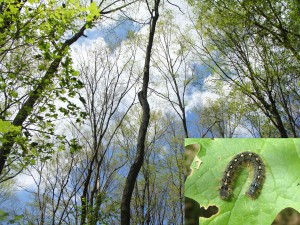Of Black Bears and Caterpillars
Terry Sprague | Jun 05, 2010 | Comments 4
The host of the hike was beside himself. He wanted to showcase the forest behind his house for this special event at his home along Moneymore Road, near Roslin, for the Ontario Woodlot Association meeting. Only, this was the year for a major outbreak of forest tent caterpillar on his property which also involved over 500 adjacent acres. The name is a misnomer for they don’t build tents like the eastern tent caterpillar. They have but one thing in mind – to consume a forest and bring it to its knees. The caterpillar invasion that had resulted in between 80 and 100% defoliation was now retreating from its peak, and we noted at least one caterpillar hanging in a dehydrated loop from the bark of one tree, typical of the expected virus that would now take control of the infestation. The trees will recover nicely, and his forest will return to its original glory. It was a good day and the extra light now filtering in through the bare trees allowed us to find numerous plants including moonseed, rattlesnake fern and maidenhair fern, wild lettuce, this list went on. We found forest critters, like millipedes, wood frogs and toads and heard red-eyed vireo and wood thrush and ovenbird. I had just completed a presentation for this group called Beyond the Beech, which urged woodlot owners to look beyond the obvious and consider the biodiversity of a woodlot and how everything interacts. Now we were seeing the very things we had talked about earlier in a hall in Marlbank. We looked beyond the beech and saw many things – in fact, we had to retrace our steps once due to a black bear guarding her two cubs, swaying back and forth in a small tree. Black bears eat forest tent caterpillars, we were told. So, good things sometimes come out of a bad situation. The forest tent caterpillar peaks every 15 years or so, but how could we know that this would be the year, and this would be one of few spots in this part of Ontario where it would appear at this very moment. Seize the moment, nature interpreters have always been taught, and that we did, discussing an insect that few of us ever get to experience. And we had a heart stopping moment to boot when we came upon the bears.
Filed Under: Uncategorized
About the Author: Terry Sprague became interested in nature at an early age. "Growing up on the family farm at Big Island, 12 miles north of Picton, on the shore of the beautiful Bay of Quinte, I was always interested in the natural world around me. During my elementary school days at the small one-room school I attended on Big Island, I received considerable encouragement from the late Marie Foster, my teacher in Grades 6 through 8. Her home was a short distance from where I lived and through the years she was responsible for developing my interest in birds. The late Phil Dodds, a former editor with the Picton Gazette, also a great nature enthusiast, suggested I undertake a nature column - a column I have submitted weekly since 1965. The column has since expanded to the Napanee Beaver and the Tweed News. Life has been good, and through the years I have enjoyed working with such nature related agencies as Glenora Fisheries Research as a resource technician, Sandbanks Provincial Park as a park interpreter and Quinte Conservation as a naturalist and outdoor events coordinator. As a nature interpreter, currently working from my home office, I now create and lead numerous interpretive events in the area and offer indoor audio/visual presentations to interested groups. Could one who is interested in nature have enjoyed a more exhilarating period in the work force?" Terry's website is www.naturestuff.net

































My father used to say that the tent caterpillars were there to kill the week trees and shrubs and to fertilize the healthy next year with their excrement. I don’t know if that is true or not but I like the idea.
Kathy, hold your control key while scrolling the mouse wheel. That will make the type bigger (or smaller). – Ed
The caterpillars you write about are ugly things here in the Northeast part of the US also. Some years the trees are covered with the white webs or sacks. I don’t know the correct name, but they are nasty!
Would have loved to have seen the swinging cubs, but would have stayed my distance! My Dad always ran into a bear when blue-berrying in Maine, so carried his rifle with him. He would not have used it unless it was a matter of life or death…(his)!
I think blog print should be bigger so I can read all this interesting stuff!